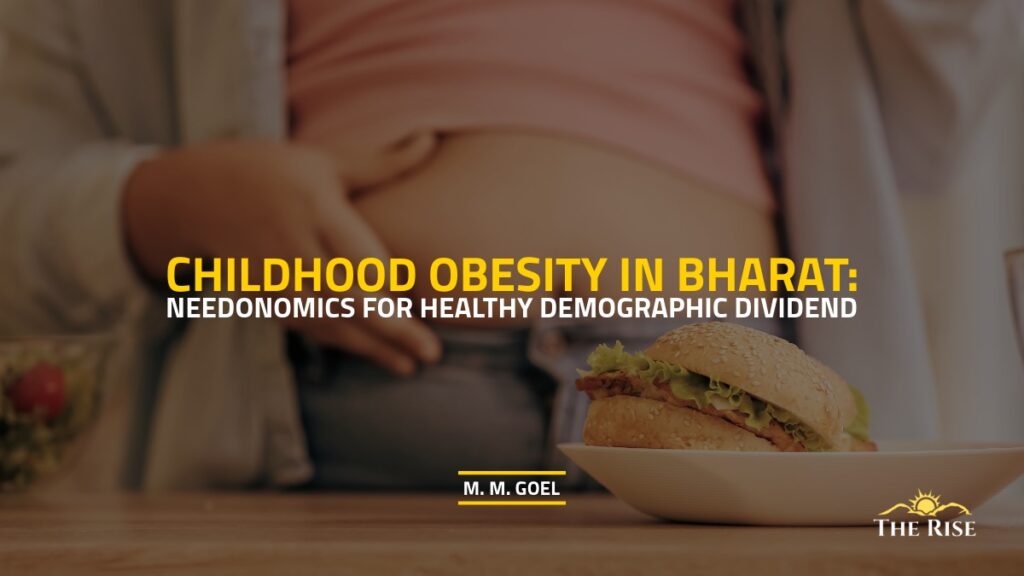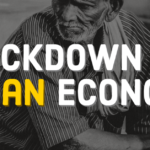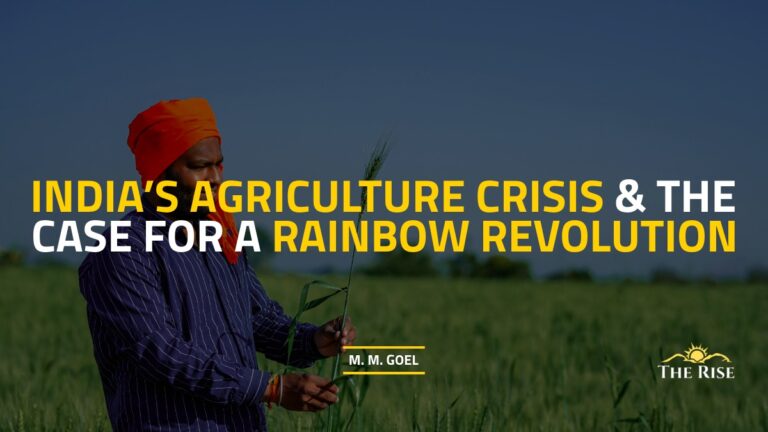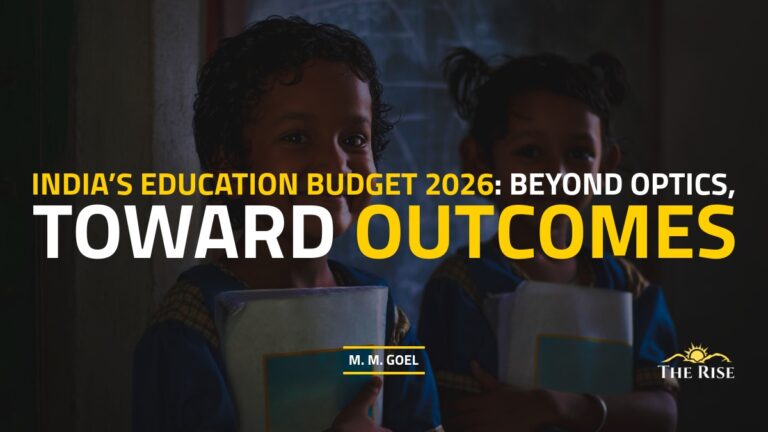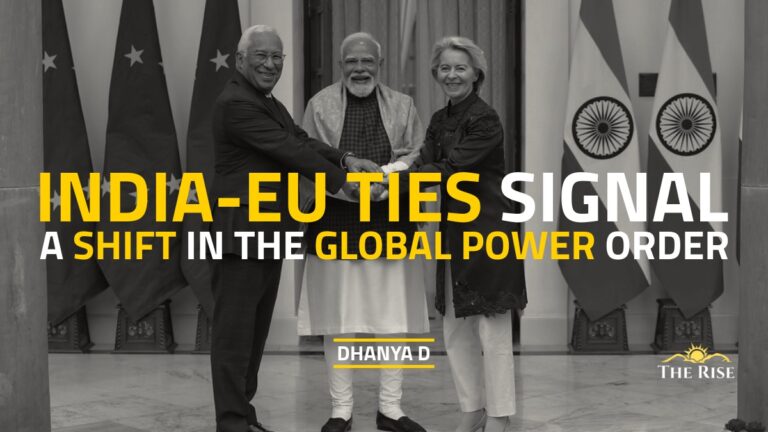The obesity crisis among children is not just a health issue; it is a moral, social, and economic challenge. By prioritizing needs over wants, by embracing mindful needo-consumption, and by balancing food with physical activity and digital fasting, Bharat can safeguard the health of its future generations.
The recently released Child Nutrition Report 2025 of UNICEF, titled “Feeding Profit: How Food Environments Are Failing Children”, is a wake-up call for policymakers, parents, and society at large. It reveals a disturbing trend: obesity has now overtaken being underweight as the most prevalent form of malnutrition among children globally.
This paradox, where children are simultaneously overfed and undernourished, stems not from a lack of food but from not eating enough of the right food. Needonomics School of Thought (NST), which emphasizes the prioritization of needs over wants and mindful consumption, has analyzed this report and raised deep concerns for Bharat.
According to projections, India is expected to contribute nearly 11 per cent of the world’s obesity problem by 2030. This alarming figure signals a looming crisis that threatens to undermine the very foundation of Bharat’s demographic dividend. If corrective measures are not taken urgently, the promise of a young, energetic, and productive workforce could instead turn into a liability of unhealthy, unfit, and economically burdened citizens.
Obesity: New Face of Malnutrition
Traditionally, malnutrition in India has been equated with undernutrition—insufficient calories, stunting, and wasting among children. While these remain significant challenges, a silent and insidious transformation has taken place. Obesity has emerged as the new face of malnutrition, even among children from modest economic backgrounds.
The culprit is not scarcity, but the quality of the food environment. Ultra-processed foods, rich in fats, sugars, and salts, have deeply penetrated our households. Packaged snacks, carbonated beverages, instant noodles, fried fast foods, and sugar-laden bakery items have rapidly replaced wholesome traditional diets. This shift is reinforced by aggressive marketing, peer pressure, and the allure of convenience.
Also Read: Reimagining the Global Economy: Empowering Vision of Needonomics
The Economic Survey 2024–25 identifies the booming sales of ultra-processed food as a key driver of the obesity menace. Street food and fast-food culture—characterized by being cheap, quick, and filling—further exacerbates the trend, especially among school-going children and adolescents. Combined with sedentary lifestyles driven by excessive screen time, binge-watching, online gaming, and social media addiction, the result is a generation at high risk of lifestyle diseases such as diabetes, hypertension, and cardiovascular disorders—once thought to be ailments of middle and old age.
Needonomics Perspective: Why Consumption Patterns Matter
NST asserts that the root of this crisis lies not merely in what is available in the market, but in how individuals and families choose to consume. Needonomics emphasizes need-based, mindful, and cautious consumption—what I call needo-consumption. This approach stands in sharp contrast to the reckless indulgence in want-driven, profit-promoted, and convenience-oriented food choices.
Needo-consumption demands that children (and adults) be encouraged to ask:
- Do I really need this food item, or am I eating it simply because it is available, inexpensive, or appealing?
- Does this food contribute to my nutrition, energy, and health, or does it only satisfy my tongue and appetite?
By internalizing such self-reflective questioning, individuals can resist the lure of ultra-processed foods and instead prioritize nutritious alternatives such as seasonal fruits, vegetables, millets, pulses, and traditional home-cooked meals.
Also Read: Aging Gracefully with Needonomics: Habits of Head and Heart for a Meaningful Life
The philosophy of Needonomics also calls for digital fasting—a deliberate reduction of screen time to combat sedentary behaviour. Just as food fasting is meant to detoxify the body, digital fasting is necessary to detoxify the mind and lifestyle. Reclaiming time for physical activities such as sports, yoga, walking, and outdoor play is as critical as ensuring a balanced diet.
Threat to Demographic Dividend
Bharat is at the cusp of reaping its demographic dividend, with a significant proportion of its population under the age of 35. However, this dividend is not automatic. It requires a healthy, educated, and skilled workforce to translate into higher productivity and economic growth.
If obesity and related health issues rise unchecked, the demographic advantage could quickly erode into a demographic burden. Imagine a future where millions of young Indians suffer from chronic illnesses, reduced physical stamina, and impaired cognitive functioning. The resulting economic cost, in terms of healthcare expenditure, loss of productivity, and reduced life expectancy, would be catastrophic.
Hence, NST warns that nutrition security is as important as food security. The challenge is not just to ensure that every child gets enough to eat, but to ensure that they get the right kind of food to eat.
Policy Imperatives: Needonomics as a Framework
To combat this growing crisis, Bharat must adopt the principles of Needonomics in its policies and practices. NST appeals to the Government and all stakeholders to increase focus on the following:
1. Transforming the Food Environment
- Regulate the marketing of ultra-processed foods, particularly advertisements targeting children.
- Introduce clearer food labelling that highlights sugar, salt, and fat content in simple language.
- Promote access to affordable, nutritious alternatives like fruits, vegetables, and millet-based products.
2. Nutrition-Centric Education
- Make nutrition literacy an integral part of school curricula.
- Encourage school canteens and midday meal programs to provide balanced meals rich in local produce.
- Launch awareness campaigns targeting parents, empowering them to make better food choices for their families.
3. Promoting Physical Activity and Digital Fasting
- Mandate at least one hour of physical education or sports in schools daily.
- Create safe and accessible community spaces for outdoor activities.
- Encourage digital fasting by promoting cultural, spiritual, and social activities that reduce screen dependency.
4. Research and Monitoring
- Establish a national nutrition surveillance system to regularly monitor childhood obesity trends.
- Invest in research on the long-term impact of ultra-processed food consumption in Indian contexts.
- Integrate the Economic Happiness Index (EHI), as proposed by NST, to measure well-being beyond GDP.
Role of Families and Communities
While government policies are crucial, the battle against childhood obesity must begin at home. Parents, as the first educators, have a moral responsibility to model healthy eating habits. Communities must revive traditional dietary practices that emphasize balance, moderation, and natural ingredients. Religious and social institutions can also play a role by advocating moderation, self-control, and the moral dimension of consumption.
Conclusion
The obesity crisis among children is not just a health issue; it is a moral, social, and economic challenge. By prioritizing needs over wants, by embracing mindful needo-consumption, and by balancing food with physical activity and digital fasting, Bharat can safeguard the health of its future generations. The vision of Viksit Bharat cannot be realized with an unhealthy population. The adoption of Needonomics in totality provides a holistic pathway: it is not about denying children joy, but about guiding them toward mindful choices that enrich both body and soul.
Obesity may have overtaken under-nutrition today, but with the right philosophy, policies, and practices, Bharat can reverse this trend. Let us remember: a healthy child is the true capital of a healthy nation. The time to act is now, before the demographic dividend turns into a demographic disaster.
Disclaimer: The views expressed in this article are of the author solely. TheRise.co.in neither endorses nor is responsible for them. Reproducing this content without permission is prohibited.
About the author
Prof. Madan Mohan Goel, Former Vice Chancellor and Propounder of Needonomics School of Thought.

